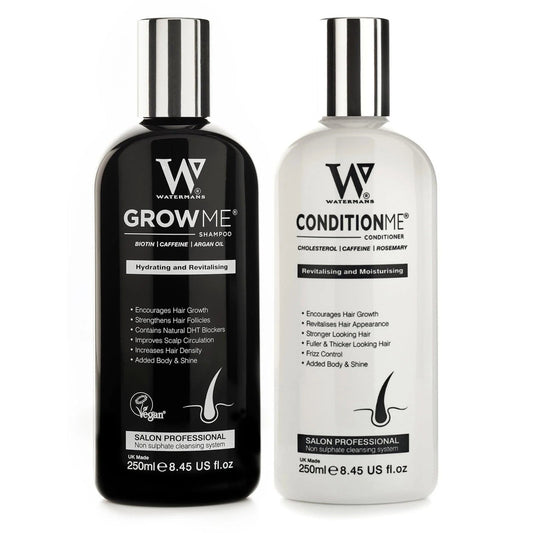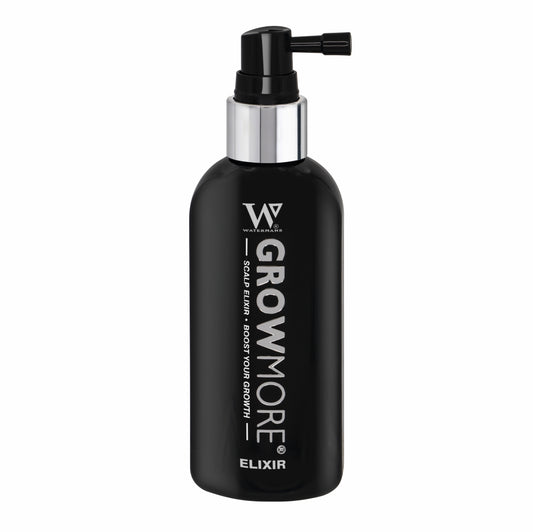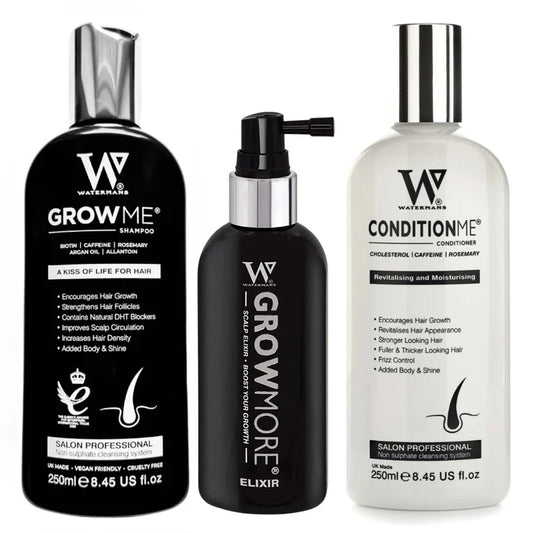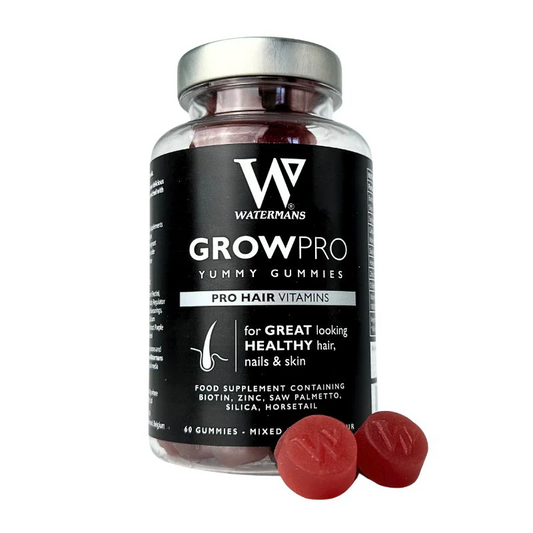Banish the Blues: Unlocking the Secrets of Vitamin D Deficiency and Its Impact on Your Health
Share

Vitamin D Deficiency: Banish the Blues and Boost Your Health Naturally
Vitamin D is often called the “sunshine vitamin,” but did you know that many people suffer from vitamin D deficiency without realizing it? This hidden health problem can have surprising effects on your body, including your mood, energy levels, and even your hair health. In this article, we’ll unlock the secrets of vitamin D deficiency, explain why it matters, and show you how to boost your vitamin D naturally to feel your best.
If you’re also tackling hair loss or looking for ways to improve hair growth, you’ll want to learn about Watermans Grow Me Shampoo – an all-natural, gentle hair care solution that nourishes your scalp with ingredients like biotin, rosemary, caffeine, and argan oil to energize hair follicles and improve hair volume.
What is Vitamin D and Why Do We Need It?
Vitamin D is a fat-soluble vitamin that acts more like a hormone in the body. It helps your body absorb calcium and phosphorus, which are essential for strong bones and teeth. But vitamin D does much more:
- Supports immune function
- Regulates mood and brain health
- Aids muscle function
- Promotes skin and hair health
The primary source of vitamin D is sunlight. When UVB rays hit your skin, your body produces vitamin D naturally. But modern lifestyles—spending most time indoors, using sunscreen, living in cloudy or wintery climates—can all reduce your body's vitamin D production.
What Causes Vitamin D Deficiency?
Vitamin D deficiency happens when your body hasn’t got enough vitamin D to carry out its vital functions. There are several reasons this can occur:
- Limited Sunlight Exposure: People who live in northern latitudes, or spend too much time indoors, often don’t get enough sunlight to produce vitamin D naturally.
- Skin Pigmentation: Darker skin has more melanin, which reduces vitamin D production, so people with darker skin may need more sunlight than those with lighter skin to make adequate levels.
- Age: Older adults produce less vitamin D in response to sunlight.
- Diet: Vitamin D is found naturally in very few foods, such as fatty fish (like salmon), egg yolks, and fortified foods like milk or cereal. Without enough dietary intake, deficiency can occur.
- Health Conditions: Some medical issues affect vitamin D absorption, including celiac disease, Crohn’s disease, and kidney or liver problems.
- Obesity: Vitamin D is fat-soluble and can be trapped in fat tissue, making it less available to the body.
Signs and Symptoms of Vitamin D Deficiency
Vitamin D deficiency can be tricky to spot because early symptoms are often mild or mistaken for something else. Common signs include:
- Feeling tired and fatigued
- Frequent infections or sickness
- Muscle weakness or bone pain
- Mood changes like feeling down or depressed
- Hair thinning or hair loss (especially unusual for your age)
Because vitamin D helps maintain health in so many parts of your body, deficiency can affect your bones, immune system, mood, and even your hair.
The Link Between Vitamin D Deficiency and Hair Loss
Did you know that vitamin D plays a crucial role in hair follicle cycling and hair growth? Hair follicles undergo growth cycles, including growth (anagen), resting (telogen), and shedding (catagen). Vitamin D receptors located in hair follicles activate hair growth and follicle regeneration.
When you don’t have enough vitamin D:
- Hair follicles may become dormant
- Hair growth slows down
- Hair shedding increases, leading to thinning or patchy hair loss
Studies suggest that vitamin D deficiency may be linked to alopecia areata (an autoimmune hair loss condition) and other hair thinning problems. If you’re experiencing hair loss or brittle hair, checking your vitamin D levels could be an important step.
How to Check Your Vitamin D Levels
The simplest way to know if you have vitamin D deficiency is through a blood test. This test measures 25-hydroxyvitamin D, the main form circulating in your blood.
- Levels below 20 ng/mL (50 nmol/L) usually indicate deficiency
- Levels between 20-30 ng/mL suggest insufficiency
- Ideal levels are often considered between 30-60 ng/mL
Your doctor can advise if you need supplements or other treatments based on your results.
Natural Ways to Boost Your Vitamin D Levels
If you’ve discovered or suspect low vitamin D, here are natural ways to improve your levels safely:
1. Get More Sun Exposure
Aim for 10–30 minutes of midday sunlight several times a week on your face, arms, and legs without sunscreen (but avoid burning).
Conditions like skin sensitivity, latitude, weather, and time of year affect how much sunlight you really need.
2. Eat Vitamin D-Rich Foods
Include foods like:
- Fatty fish (salmon, mackerel, sardines)
- Egg yolks
- Fortified dairy or plant milks
- Fortified cereals
3. Use Supplements if Needed
If natural methods aren’t enough, supplements can help. Check with your healthcare provider before starting vitamin D supplements to get the correct dose.
Vitamin D and Hair Health: Boosting Growth Naturally
While fixing vitamin D deficiency is important, you can also support your hair with natural products that nourish your scalp and stimulate hair follicles:
Watermans Grow Me Shampoo combines biotin, rosemary, caffeine, niacinamide, argan oil, allantoin, and lupin protein. This unique formula energizes the scalp and volumizes hair from the roots without harsh chemicals, making it a popular choice for people facing hair thinning or hair loss.
Regular use helps:
- Strengthen hair follicles
- Improve scalp health
- Reduce shedding
- Promote fuller, thicker hair
Give it a try for a natural, non-medical, and gentle solution for hair growth while you manage your vitamin D levels.
FAQs About Vitamin D Deficiency
Q1: Can vitamin D deficiency cause depression?
Yes, low vitamin D levels are linked to mood disorders including depression, as vitamin D helps regulate brain chemicals like serotonin.
Q2: How long does it take to correct vitamin D deficiency?
Depending on severity, it may take weeks to months of increased sunlight, dietary changes, or supplements to normalize levels.
Q3: Is vitamin D deficiency common?
Yes, worldwide many people suffer from low vitamin D due to indoor lifestyles and limited sun exposure.
Q4: Can Vitamin D overdose happen?
Too much vitamin D from supplements can be harmful and cause toxicity, so always follow doctor’s guidance.
Q5: Can children get vitamin D deficiency?
Yes, children are at risk, especially if breastfed exclusively without supplements or living in areas with little sunlight.
Q6: Does sunscreen block vitamin D production?
Yes, sunscreen reduces skin’s ability to make vitamin D, but should still be used to prevent sunburns after a short initial sun exposure.
Q7: How does vitamin D help the immune system?
Vitamin D activates immune cells and helps fight infections.
Q8: Is it safe to get vitamin D from tanning beds?
Tanning beds emit harmful UV rays and are not recommended for vitamin D production.
Q9: Can vitamin D deficiency cause bone pain?
Yes, low vitamin D weakens bones, leading to pain or increased risk of fractures.
Q10: How do I know if watermans Grow Me Shampoo is right for me?
If you are experiencing hair thinning or loss, especially if linked to nutrient deficiencies like vitamin D, Watermans Grow Me Shampoo is a gentle and natural boost to your hair care routine.
Did You Know? Vitamin D Facts You Might Not Know
- Vitamin D is actually a hormone: Unlike other vitamins, it is produced in the skin and acts throughout the body like a hormone.
- Over 1 billion people worldwide have low vitamin D: It’s a common but often overlooked problem.
- Vitamin D helps hair follicle growth: Without it, hair follicles can remain stuck in a resting phase, blocking hair growth.
- You can’t rely on food alone: Natural foods have little vitamin D, so sun exposure or supplements are usually necessary.
- Vitamin D impacts your immune defense: It helps battle viruses and bacteria, making it vital during cold and flu seasons.
Addressing vitamin D deficiency is a key step not only to boosting your overall health but also to improving your hair and mood naturally. Incorporate safe sun habits, vitamin D-rich foods, and consider boosting your hair with natural products like Watermans Grow Me Shampoo for the best results. Take control today for healthier hair and happier days!



